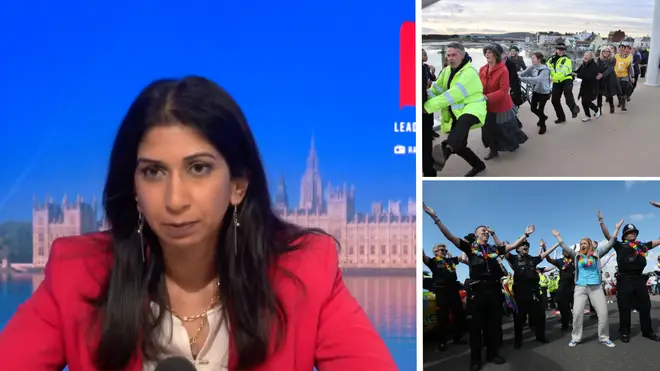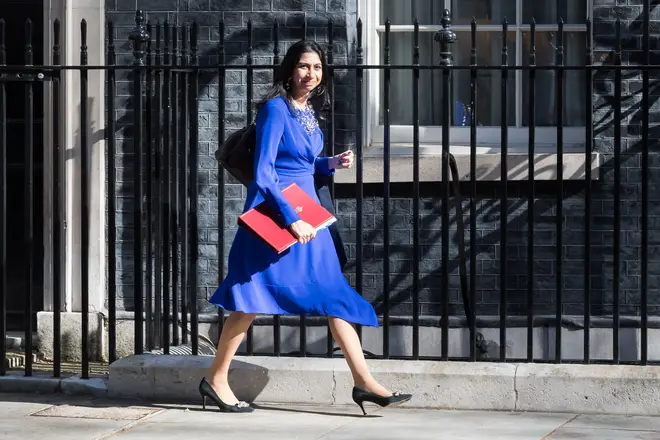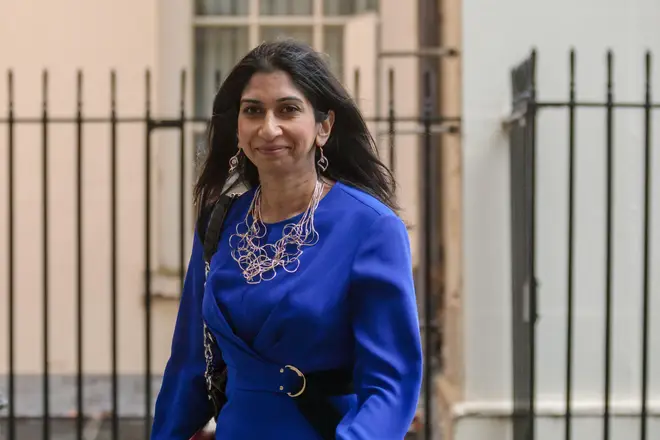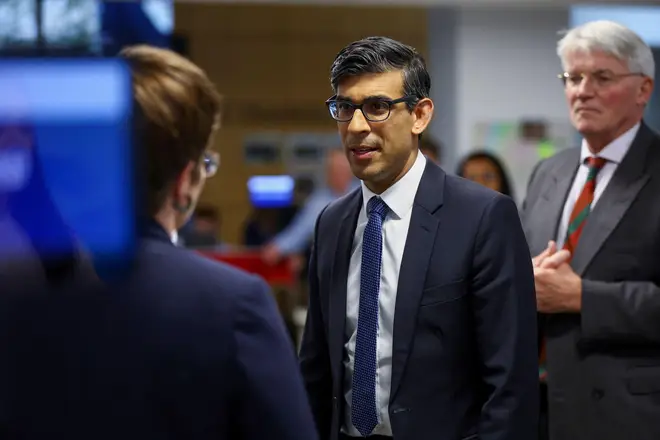
Matthew Wright 7am - 10am
26 April 2023, 08:35 | Updated: 26 April 2023, 08:48

Suella Braverman has called for police to use increased stop and search powers, instead of "getting into debates on social media about gender" and "dancing on the street".
Speaking to LBC's Nick Ferrari on Wednesday, the home secretary explained her idea of "common-sense policing" that she wants officers to focus on, rather than "political correctness".
"Common-sense policing is about responding and reflecting the priorities that the British people have," she said.
"So we don't want to see the police getting into debates on social media about gender. We don't want to see the police dancing on the street.
"We don't want to see the police holding back from taking courageous decisions on grooming gangs because of fears of political correctness.

The Home Secretary Suella Braverman comments on the Golly Dolls confiscated in an Essex Pub
"I want to see the police using their stop and search powers - their increased... stop and search powers that we've given them so that they can reduce violence and save lives."
Asked by Nick if she was concerned that increasing the use of controversial stop and search powers would alienate some communities, she said she was pleased that more people from ethnic minorities had joined police forces.
"One priority of policing is to engage proactively with communities," she said. "That's why I'm very pleased that we have a very high number of people coming into the police force from ethnic minorities, women, so that we are reflecting the communities that we engage with."
She added: "I think the public would agree that there's a perception that the police have been pulled off track on some instances and particularly some high profile instances.
"That's one reason why I've introduced new guidance on non-crime hate incidents, so that we ensure that freedom of expression is protected and that the police are not overly policing lawful" incidents.

Suella Braverman on 'militant protesters' and 'eco-zealots'
Asked by Nick about the recent incident with police removing golly dolls from a pub in Essex, the Home Secretary declined to comment on an ongoing investigation.
But she added: "I do have concerns more generally about the police responding to complaints about hurt feelings or offence taken.
"I'm afraid lawful debate does necessarily involve people getting offended and feelings being hurt. That's not the job of the police."
She added: "In the vast majority of lawful debate, lawful exchange of views, even where people may be offended, that really shouldn't be terrain for... the police".

It comes as the Prime Minister said on Tuesday night that he believed the Government was "on the cusp" of having recruited 20,000 new officers for England and Wales - a key pledge dating back to Boris Johnson's election win in 2019.
Data published by the Home Office on Wednesday morning will reveal if it has managed that.
Home Secretary Tells Police to Use Common Sense Instead of Political Correctness
Ms Braverman is then due to speak at the launch of the anti-crime campaign group the Public Safety Foundation.
She is set to say: "Common sense policing means police focused on delivering criminal justice, not social justice. That's what the public wants.
The Home Secretary joins Nick Ferrari at Breakfast on LBC this morning from 7am.

I believe in the police. But the policing in which I believe isn't riven with political correctness but enshrined in good old-fashioned common sense
"I believe in the police. But the policing in which I believe isn't riven with political correctness but enshrined in good old-fashioned common sense."
Her comments come after criticism at how officers have policed events.
A man came close to arrest on Tuesday morning following a heated confrontation with Metropolitan Police officers, after footage emerged showing him attempting to push eco-protesters out the way of standstill traffic.
Officers told him that pushing them would amount to assault.
Police had previously been criticised for doing the macarena at a Pride event in Lincoln, with some branding it as "woke".
Prime Minister Claims Recruitment of 20,000 New Officers is Almost Complete
Mr Sunak is hoping to bat away criticism from his opponents about police recruitment, with suggestions it was lagging behind its commitment to replacing thousands of roles slashed during austerity.
It had until the end of March to reach the 20,000 figure.
Mr Sunak said: "When I stood at the steps of Downing Street six months ago, I made clear that I would do whatever it takes to cut crime and make our communities safer. At the heart of that pledge is recruiting 20,000 additional police officers.
"We await the final statistics expected today but, as I have previously set out, I am confident we are on the cusp of meeting that promise. This would be a significant moment, meaning we have more police officers in England and Wales than ever before.

"This is not only about putting more officers on our streets, it has also been a once-in-a-generation opportunity to change the face of policing, attracting more women and people from ethnic minority backgrounds, and making the police become more representative of the communities they serve."
£3.6 Billion Plan to Recruit 20,000 Officers Set to Cost £18.5 Billion Over Decade
Figures in January showed more than 3,000 officers needed to be recruited to hit the target.
There have been fears that a rush to bring in the new cops will lead to lower-quality or even rogue cops being hired.
The Sunday Telegraph reported some forces were bringing back failed candidates to meet the target.
And inspectors for His Majesty's Inspectorate of Constabulary and Fire and Rescue Services said problems within the Metropolitan Police were being made worse by the number of young and inexperienced staff brought in as part of the recruitment drive.
Sir Mark Rowley previously questioned the wisdom of recruiting so many officers in such a short space of time.
The Home Office has insisted they will all have to take part in the "rigorous" vetting process.
The plan will have cost £3.6 billion by March, with a total cost of £18.5 billion over the next decade.